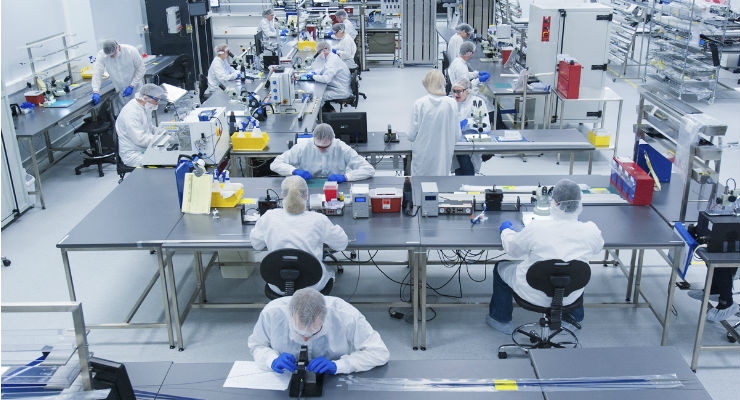The medical device industry has seen tremendous growth over the past few decades with advanced technologies improving patient outcomes. As innovation accelerates, original equipment manufacturers (OEMs) are under increasing pressure to develop new products faster while maintaining quality and regulatory standards. This is where medical device contract manufacturing has emerged as a viable solution. By outsourcing manufacturing to specialized contract manufacturing organizations (CMOs), OEMs can optimize costs and focus internal resources on R&D and commercialization activities.
The Growth of the Medical Device Contract Manufacturing Industry
The medical device contract manufacturing industry has witnessed significant expansion in recent years to meet the changing needs of OEMs. A report by Market Research Future projects the global medical device contract manufacturing market to reach $91.23 billion by 2027, growing at an annual rate of 9.4%. Key drivers include the increasing complexity of medical device development, stringent regulatory compliance requirements, and demand for reduced time-to-market.
By outsourcing various manufacturing steps like precision machining, injection molding, assembly, and sterilization, OEMs gain access to specialized expertise at scale. CMOs have invested heavily in advanced manufacturing infrastructure, quality processes, and a trained workforce. With dedicated manufacturing facilities, CMOs are able to produce higher volumes cost-effectively and maintain product consistency over the long run. They also assume responsibility for ensuring regulatory compliance through their comprehensive quality management systems.
Key Phases in Medical Device Contract Manufacturing
Medical device contract manufacturing encompasses multiple phases from product design and development to commercial-scale production.
Product Design and Development: In the early stages, CMOs work closely with OEMs on product design for manufacturability, prototyping, pilot builds, design reviews, testing, and validation. Their input helps streamline the manufacturing process and reduce costs.
Process Development: CMOs develop detailed manufacturing processes, from obtaining and approving raw materials to production planning, tooling, facility and equipment requirements, and process controls. Robust processes are essential for regulatory approvals.
Pilot and Regulatory Manufacturing: Pilot production runs test the processes at a small scale. CMOs then manufacture validation and registration batches under regulated conditions for submission to health authorities.
Commercial Manufacturing: Once products receive approvals, CMOs ramp up full-scale commercial production to meet global demand. Their experience and flexible facilities help ensure consistently high yields and quality.
Sustaining Engineering Support: Even after product launch, CMOs may provide ongoing sustaining engineering support including design changes management, corrective and preventive actions,Failure Modes and Effects Analysis reviews, and continuous improvement.
Key Advantages of Medical Device Contract Manufacturing
By leveraging the specialized resources and expertise of CMOs, OEMs gain significant strategic and operational advantages:
Access to Advanced Infrastructure: CMOs make multimillion-dollar investments in state-of-the-art cleanrooms, machining centers, molding presses, assembly lines, and automated packaging and labeling equipment required for medical devices.
Regulatory Compliance Assistance: Having detailed knowledge of international quality standards like ISO 13485 and FDA/EU regulations, CMOs ensure products meet all compliance requirements through validated processes.
Rapid Scale-Up Capabilities: When OEM products take off commercially, CMOs can rapidly ramp up production through their dedicated capacity and flexibility without major capital investments by the OEM.
Lower Total Cost of Operations: By utilizing plant load efficiencies across multiple customers, CMOs achieve lowered unit costs benefits which they share with OEMs. Overall expenses are lower than maintaining in-house manufacturing.
Technical Expertise: CMOs employ highly-skilled engineers, quality specialists, direct labor workforce with expertise in various technologies like metals fabrication, catheter assembly, and finished device sterilization.
Risk Mitigation: Outsourcing production mitigates financial risks associated with underutilized manufacturing capacity, inventory management issues, or failure to meet demand due to internal production problems.
Focus on Core Activities: With manufacturing outsourced, OEMs gain more resources and mindshare to concentrate on innovation, new product development, clinical trials, sales and marketing.
As the medical device industry rapidly progresses towards more customized, minimally invasive, and combination products, outsourcing to specialized CMOs is having an increasing impact. By leveraging external manufacturing partners, more companies are able to bring groundbreaking technologies to market quickly while ensuring the highest quality, regulatory compliance, and cost efficiency throughout the product lifecycle.
In summary, medical device contract manufacturing provides significant strategic benefits that allow both innovator companies as well as CMOs to grow and thrive in an evolving market. As demand increases and technologies become more complex, this partnership-based approach will continue strengthening to move healthcare forward.


